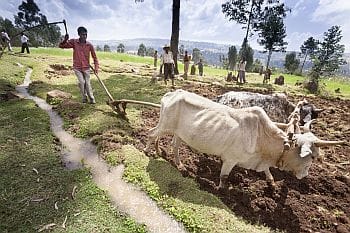To coincide with the 14th Global Conference of the International Association for the Study of the Commons, taking place in Japan this week, we highlight research on community resource management in Ethiopia.

“People are selfish by nature and, when left to manage them on their own, will overexploit natural resources.” This is the picture that Garret Hardin drew in 1968 when he first published his article “The Tragedy of the Commons”.
However, not all agreed with Hardin’s rather gloomy views on community shared resources. While it sparked a lengthy discussion on whether the solution to this debacle should be private or state ownership of communal resources, economist Elinor Ostrom suggested a third approach: the design of durable cooperative institutions that are organized and governed by the resource users themselves. Drawing on fieldwork, she demonstrated that people could collaborate and organize themselves successfully to manage common resources like forests or fisheries, even when governments are not involved.
In recent years increasing attention has been paid to community management of water and land resources. Like trees and fish, these are also becoming locally scarce in some regions. But do Ostrom’s or Hardin’s dictates hold sway when poor communities face up to resource scarcity?
Researchers from the International Water Management Institute (IWMI) studied the community based management of forest reserves or exclosures in two communities in Tigray, Northern Ethiopia. The study focused on the effectiveness of bylaws derived by the communities in addressing forest degradation, resolving conflicts among users and creating economic benefits.
Before the introduction of the bylaws, the forests had been routinely used by local people for fuel wood and construction materials. But as the forest was degraded, the livelihoods of local people were adversely affected since many were heavily dependent on forest resources.
In response to the forest degradation Ethiopians established exclosures on formerly degraded grazing lands to promote the natural regeneration of plants. The official village administration encouraged users at a public meeting to devise their own bylaws to manage the communal forests. These helped to define what the forests could be used for, how they might be protected, who could use the forest products and how collective management could be realized. “Through interviews and group discussion we found out that the village bylaws served its purpose by mitigating forest degradation”, says former IWMI researcher Mastewal Yami. “They facilitated users to have common goals in the management and also defined who would have access to the exclosures. The bylaws were also helpful in resolving problems by introducing monetary sanctions.”
However the study also identified a few shortcomings of the bylaws that will need further attention. The bylaws failed in meeting the high expectation of users to get more economic benefits, such as wood for farm tools and to harvest grass for livestock feed. Moreover, there was also no clear time-frame for extracting certain products. Another problem that was identified was the close relationships between the villagers within the community, which hindered enforcement to some extent. For instance users were hesitant to expose free riders who were relatives or neighbors.
“To address this we think the village committee should focus more on developing a sense of responsibility among users rather than focusing on penalties”, says Yami. “But other actions should be taken too. For instance it would be advisable to plant fast growing trees in the exclosures to meet the energy demands. Planting trees to be utilized for livestock feed could also be an important step to achieve more of the economic benefits from the exclosures.”
IASC 2013 the 14th global conference of the International Association for the study of the commons is being held in Japan June 3-7. This year’s theme is Commoners and The Changing Commons: Livelihoods, Environmental Security, And Shared Knowledge.
Yami, Mastewal; Mekuria, Wolde; Hauser, M. 2013. The effectiveness of village bylaws in sustainable management of community-managed exclosures in northern Ethiopia. Sustainability Science, 8(1):73-86. doi: http://dx.doi.org/10.1007/s11625-012-0176-2

